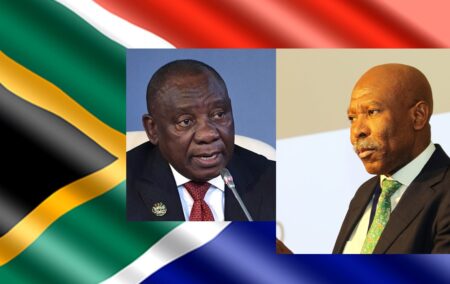It should heed South African Reserve Bank governor Lesetja Kganyago’s advice that ‘restoring confidence is the cheapest form of stimulus’.
Earlier this month Cyril Ramaphosa issued an ‘address to the nation’ in which he said ‘our country has been deeply traumatised by acts of extreme violence perpetrated by men against women and children’. We had also been ‘deeply traumatised by acts of violence and criminality directed against foreign nationals and our own citizens’. People had lost their lives, livelihoods had been destroyed, and there was no justification for any of this.
The very next day President Ramaphosa issued a press statement hailing a man whose government traumatised his country, destroyed livelihoods, and perpetrated acts of extreme violence and criminality against his own citizens.
He thus described Robert Mugabe, who had recently died, as a ‘liberation fighter and champion of Africa’s cause against colonialism’. The apartheid state, Mr Ramaphosa added, had ‘brutalised and violated Zimbabwe as punishment for supporting our own Struggle’. The secretary general of the African National Congress (ANC), Ace Magashule, saluted the late president of Zimbabwe as ‘having devoted his life to the service of his country and its people’. Mr Mugabe, he said, ‘epitomised the new African’ (quite an admission).
Protocol no doubt dictates that one sends a message of condolence to a neighbouring state when its former president dies. Sometimes, of course, this can be a little excessive, as when Eamon de Valera, then prime minister of Ireland, visited the German legation in Dublin to sign its condolence book on the death of Adolf Hitler. It was perhaps unfortunate for the ANC that Mr Mugabe, who ‘brutalised and violated’ his country to a far greater extent than the ‘apartheid state’ or Ian Smith’s government ever did, died just as the ANC and its leader were bewailing violence and criminality in South Africa.
Their attitude is of course cynical, hypocritical, and morally deficient, as we have come to expect. But it is also both a reminder and a warning. Even before he launched his war against white farmers, Mr Mugabe had launched a war against his black opponents. This is exactly what the ANC did when it launched its ‘people’s war’ both to destabilise the previous government and to destroy its black opponents. It suited the British, American, and other governments to turn a blind eye to Mr Mugabe’s early murderous violence, just as they turned a blind eye to the ANC’s people’s war.
Perhaps, as some journalists have suggested, the ANC has stood by Mugabe for the sake of ‘African solidarity’. A better explanation is that it stood by Mugabe because it approved not only of the manner in which he consolidated himself in power but also of his war against white farmers.
There is a big difference between the state-sponsored violence that Mr Mugabe inflicted upon his country in his reign of terror, and the grass-roots violence that is now endemic in South Africa and which Mr Ramaphosa’s government is unable to stop because it is simply too feckless to do so. Having undermined the criminal justice system through cadre deployment, affirmative action, and corruption, the government is reduced to repeated exercises of public handwringing, along with promises of harsher sentences, updating the national register of male sexual offenders, improved conviction rates, denying bail, and the like.
Feeble, feckless, hopeless, and pathetic. Yet just as Mr Ramaphosa calls for everyone to ‘work together’ to end the violence that has ‘engulfed our streets and damaged our economy and confidence in our country’, he and his government are busy with reckless plans to do even more damage to both confidence and the economy. Prominent among these plans is the threat to impose a national health insurance system which the government has neither the money to finance nor the ability to manage.
Another threat is that of introducing legislation to compel managers of pension and other savings funds to invest part of those funds in government assets. The third great threat is to amend the Constitution to provide for the expropriation of land and other assets without compensation.
Implementation of these three policies will do incalculable damage to the economy, as the Institute of Race Relations (IRR) has taken the lead in repeatedly pointing out. The mere threat of them is already harming business confidence, now at historically low levels. Yet even as the entire world witnesses the inability of Mr Ramaphosa and his government to do the most basic job of preserving law and order, that government seeks, absurdly, to appropriate ever more powers for itself.
From time to time, members of the ANC (and others) call for fiscal measures and/or lower interest rates to stimulate the economy. Yet, as the governor of the South African Reserve Bank, Lesetja Kganyago, told a parliamentary committee last week, ‘restoring confidence is the cheapest form of stimulus’.
Simply removing the threats to property rights, people’s savings, and the private health system will do wonders for restoring confidence.
Kane-Berman is a policy fellow at the IRR.
If you like what you have just read, become a Friend of the IRR if you aren’t already one by SMSing your name to 32823 or clicking here. Each SMS costs R1.’ Terms & Conditions Apply.

